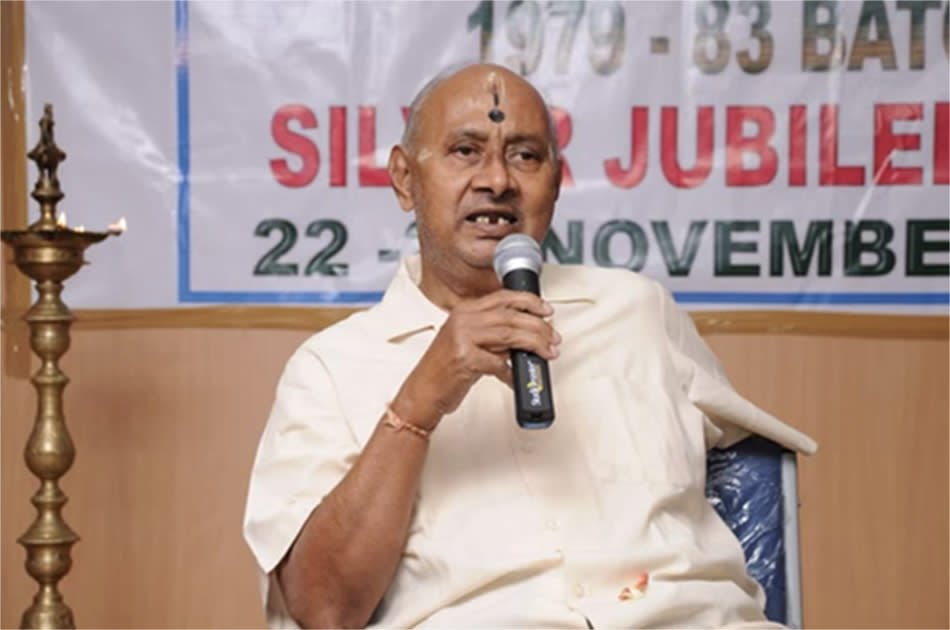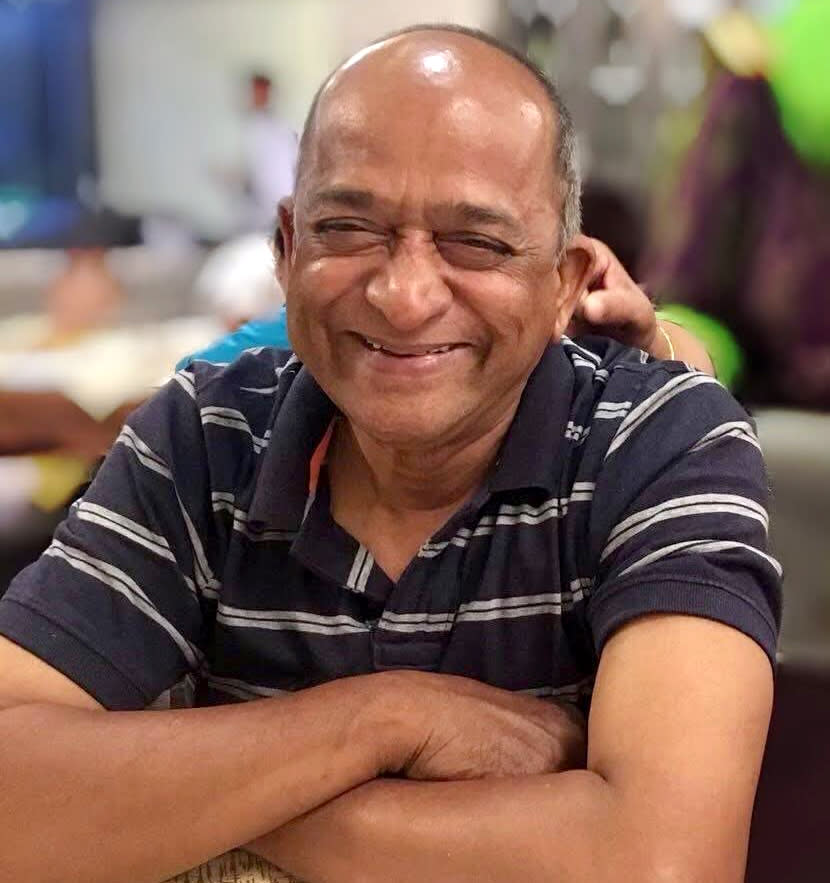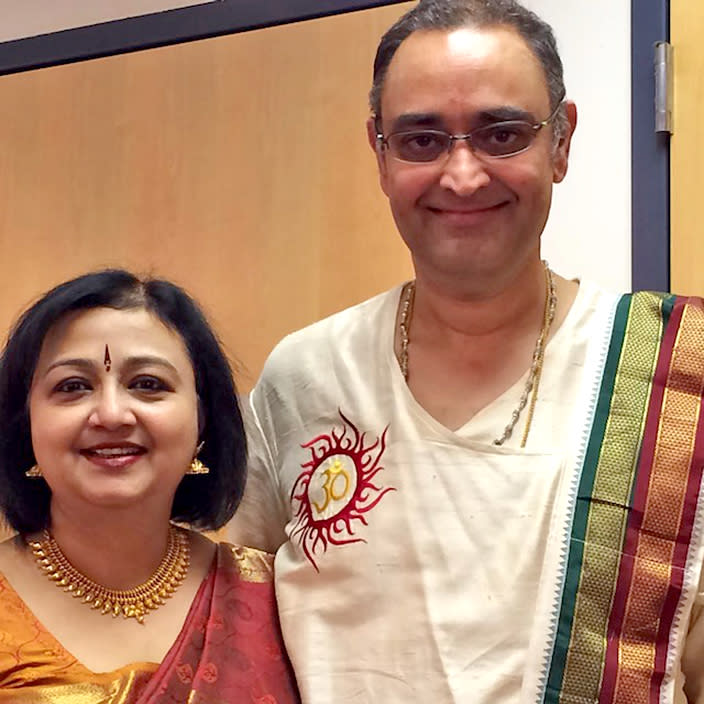Covid devastation in India unites diaspora in relentless grief
- Oops!Something went wrong.Please try again later.
Purna Prasad's phone buzzed with urgent WhatsApp messages from family and friends detailing the dire situation in India, his home country he emigrated from 34 years ago, as Covid-19 cases were surging across the nation.
In a matter of weeks, the Long Island, New York, resident would learn his father-in-law, 86, died from the virus and over a dozen more family members and friends in Bangalore became infected.

Experts say the collective grief the community is experiencing — with more than 300,000 deaths in the country, a number experts say is likely much higher — is uniquely profound given that so many across the diaspora have been impacted. This type of large-scale tragedy has never happened on the South Asian subcontinent, said K. “Vish” Viswanath, a professor at the Harvard T.H. Chan School of Public Health.
“There are more people that are a part of Indian diaspora than any other time in history. Second, we are spread all over the world. Third, it's a media age: We can see the tragedy happening in South Asia. Social media is interconnecting us, and WhatsApp, we are hearing from family and friends, and that gets amplified,” he said. “Everyone is touched by this.”
Prasad is one of about 18 million Indians living outside the subcontinent who have witnessed the devastating effects of the second Covid-19 wave in India.
At a San Francisco-area Hindu temple, people have been stopping by to pray for loved ones overseas who have been affected by Covid-19, according to the temple’s head priest, Balakrishna Kambhampati, whose uncle died from the virus and whose son and mother, all who live in India, have been infected as well. One of the temple’s members, Deep Agarwal, told NBC Bay Area he was using the temple as a place to grieve and seek hope after more than 20 of his family members were infected.
In early May, India registered over 400,000 positive Covid-19 cases in one day and set a record with 3,689 deaths on May 2. Then, weeks later, the country saw 4,529 deaths in one day. To date, the country has reached more than 25 million confirmed cases.
The sheer number of infections and deaths in India has spurred fear and worry for many in the South Asian diaspora, Viswanath said.
“There is a sense of grief and concern and anxiety among people of South Asian descent,” Viswanath said. “We all have family, extended family back home who we are worried about.”
With limited options of hopping on a flight to be closer to family during this time, several people in the South Asian diaspora who spoke to NBC Asian America expressed an overwhelming sense of helplessness as they watched and listened to family members describe the situation unfolding in India.
This sort of helplessness is a form of invisible trauma that has become common in the pandemic era, according to Dorothy Holinger, author of “The Anatomy of Grief.” She described the phenomenon as collective grief, one that is different from the collective grief experienced by Americans during World War I, World War II or the Sept. 11 attacks.
Holinger said the grief people in the Indian diaspora are feeling right now is relentless.
"The collective grief that millions of Indians living elsewhere share is a sorrow that is connected to their mother country for the loved ones and friends lost to Covid," she said. "Helplessness can be paralyzing, and it's a trauma that is distant. The inability to be there to know what is going on emotionally and cognitively, I can imagine, affects a person’s sleep, appetite and many bodily functions. This invisible trauma is having a huge effect on people."
Holinger added that the body undergoes changes while bereaving.
“The heart beats faster; blood pressure goes up; feeling faint, queasy; saliva dries up; the face loses color; and sweaty palms: These are some of the physical changes that happen as new, acute grief affects the brain and the body,” she said.
Meesha Patel, 29, of Houston, shared similar feelings of helplessness as she watched her father mourn the loss of her uncle, his brother, after he died of Covid-19 on March 22.
“I felt really uneasy,” Patel recalled as she watched her father grow increasingly worried about his brother in the days leading up to his death. “Like, I can't be there. How do I go out there to help them? How can I help them from being here? It's just this feeling of shock and helplessness.”
Patel’s aunt had to take her uncle to three different hospitals in Anand, Gujarat, all while he was experiencing serious Covid-19 symptoms. It was the fourth hospital that eventually admitted her uncle, Jagdish Patel, but by that time, his health had deteriorated so rapidly that he died. He was 63 years old.

“You're on the other side of the world. I mean, it's really difficult, and even right now listening to all the things that are happening in India, it's really tough,” Patel said. “I have that feeling like, well, I wish I could be there and do something.”
Experts are attributing the surge in cases to a number of factors, including mass religious gatherings like the weekslong Kumbh Mela in Haridwar in April and political events like the assembly elections in the state of West Bengal and rallies hosting thousands of supporters by Prime Minister Narendra Modi and his Bharatiya Janata Party. Although new Covid-19 cases are starting to subside, the country's total of more than 25 million cases trails just behind the United States' more than 32 million.
Patel, who volunteers for Bochasanwasi Shri Akshar Purushottam Swaminarayan Sanstha, a nonprofit group providing aid to people on the ground in India, has been fundraising and raising money for Covid-19 relief aid to send to India. She recently finished a vaccine drive in Houston, too.

Those who are grieving but also have the capacity or ability to help in times of traumatic events may see their grief tempered, Holinger said.
“If people are able to help in an active way, it can be wonderfully healing,” she said. “People talking to their relatives or sending them care packages is really moving forward for their grief, and it is a way for grief to be subdued.”
Viswanath said the response has been unprecedented.
“I am getting calls all the time of people asking how they can help,” he said. “What this news coverage has mobilized people to do — something individually and collectively — and I have not seen this before.”
Prasad and his wife have also tried to stay active by supporting their family from afar, whether that’s taking phone calls from relatives, fundraising or sending remittances, sums of money diaspora communities send to relatives in other nations.

The monetary support Prasad has sent to India has increased by about 15 percent. It’s a cost he said he wants to bear if it means keeping his relatives alive.
“It's a question of survival for them,” he said, referring to his family in India. “They need to be sequestered at home. They need to have their food delivered, their medication delivered. Whatever is needed, we will provide for them, even if we have to cut something short here.”
The ability to offer support, aside from monetary or physical aid, can also be helpful and help people cope with their grief, said A. Naomi Paik, associate professor of global Asian studies and criminology, law and justice at the University of Illinois, Chicago.
"It doesn't have to be around material aid," she said. "Just helping each other grieve, collective mutual aid and coming together to donate their time together, all those small things that a government or a news media might dismiss are still very important."
Paik added that small forms of support could help create models that eventually influence government programs or even legislation.
“People who are gathering resources like sending money to their families are not unimportant. These mutual aids, like community pantries, are inspiring and can be small models to build on and multiply and help us come through a painful experience together,” she said.
Communal ways of coping after a large-scale tragedy could also help the diaspora grieve, Holinger added. This includes naming and remember loved ones in religious services, meeting with others in the community or coming together to share a meal that honors someone.
"Being able to engage communally could begin to assuage the collective grief of those who, because they live outside the country, became powerless observers and help them heal," she said.
As for Prasad and his wife, they are hoping the money, aid and phone calls are a bridge to keep them connected with the loved ones they still have left in India.
“In times of tragedy, we want to be a part of a larger community. We want to reach out, for a sense of support and a sense of belonging,” Viswanath said. “It’s people who are feeling helpless who are reaching out, but they don't want to feel helpless, they want to do something. It’s a shared community experience.”
Share your stories of women affected by Covid-19 in South Asia: A tribute to aunties.

